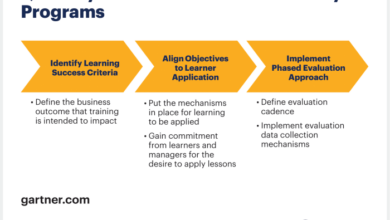
11 Tech Jobs Where You Can Earn Over $200k
11 tech jobs where you can earn a salary of over 200k – 11 Tech Jobs Where You Can Earn Over $200k – dreaming of a high-paying career in tech? This list reveals the roles that can make that dream a reality. From AI specialists to cybersecurity experts, these in-demand positions offer lucrative salaries and exciting opportunities for career growth.
We’ll delve into the skills, education, and experience needed to land these coveted jobs, along with the industry trends shaping their future.
The tech world is constantly evolving, and with it, the demand for skilled professionals continues to surge. These high-paying tech roles aren’t just about the money, though. They represent a chance to be at the forefront of innovation, solving complex problems and shaping the future of technology.
Whether you’re a seasoned veteran or just starting out, this guide will provide valuable insights into the paths you can take to reach your career goals.
High-Demand Tech Roles
The tech industry is a dynamic and rewarding field, offering lucrative salaries and opportunities for career growth. As technology continues to evolve at an unprecedented pace, certain tech roles are in high demand, with companies vying to attract and retain skilled professionals.
These roles often require specialized skills and experience, which translates into competitive salaries that can exceed $200,000.
Salaries Exceeding $200,000
Here are 11 tech jobs with salaries exceeding $200,000, along with the skills and qualifications required for each role:
- Data Scientist: Data scientists are responsible for collecting, cleaning, analyzing, and interpreting large datasets to extract meaningful insights and support business decisions. They use statistical modeling, machine learning, and data visualization techniques to identify trends, patterns, and anomalies in data.
- Skills:Python, R, SQL, machine learning algorithms, statistical modeling, data visualization, data mining, data warehousing, cloud computing, big data platforms (e.g., Hadoop, Spark).
- Qualifications:Master’s or PhD in computer science, statistics, mathematics, or a related field. Experience with data analysis and machine learning is essential.
- Average Salary:$130,000 to $250,000, depending on experience, location, and industry.
- Software Engineer: Software engineers are responsible for designing, developing, and testing software applications. They work with programming languages, software development tools, and frameworks to create innovative and efficient software solutions.
- Skills:Programming languages (e.g., Java, Python, C++, JavaScript), software development methodologies (e.g., Agile, Scrum), version control systems (e.g., Git), cloud computing platforms (e.g., AWS, Azure), databases (e.g., MySQL, PostgreSQL).
- Qualifications:Bachelor’s or Master’s degree in computer science, software engineering, or a related field. Strong problem-solving skills and a deep understanding of software development principles are essential.
- Average Salary:$110,000 to $220,000, depending on experience, location, and industry.
- DevOps Engineer: DevOps engineers are responsible for automating and streamlining the software development and deployment processes. They bridge the gap between development and operations teams, ensuring efficient collaboration and faster delivery of software updates.
- Skills:Automation tools (e.g., Ansible, Puppet, Chef), containerization technologies (e.g., Docker, Kubernetes), cloud computing platforms (e.g., AWS, Azure), scripting languages (e.g., Python, Bash), infrastructure as code (e.g., Terraform).
- Qualifications:Bachelor’s degree in computer science, software engineering, or a related field. Experience with DevOps practices and tools is essential.
- Average Salary:$120,000 to $240,000, depending on experience, location, and industry.
- Machine Learning Engineer: Machine learning engineers design, develop, and deploy machine learning models and algorithms. They work with large datasets, apply statistical and computational techniques, and build predictive models to solve complex problems.
- Skills:Python, R, machine learning algorithms, deep learning frameworks (e.g., TensorFlow, PyTorch), cloud computing platforms (e.g., AWS, Azure), data visualization tools.
- Qualifications:Master’s or PhD in computer science, statistics, mathematics, or a related field. Strong understanding of machine learning principles and experience with building and deploying machine learning models is essential.
- Average Salary:$140,000 to $280,000, depending on experience, location, and industry.
- Cybersecurity Engineer: Cybersecurity engineers are responsible for protecting computer systems and networks from cyber threats. They implement security measures, conduct vulnerability assessments, and respond to security incidents.
- Skills:Network security, ethical hacking, penetration testing, security protocols (e.g., SSL/TLS, VPN), security information and event management (SIEM), incident response, cryptography.
- Qualifications:Bachelor’s degree in computer science, cybersecurity, or a related field. Relevant certifications (e.g., CISSP, CISM, CEH) are highly valued.
- Average Salary:$110,000 to $220,000, depending on experience, location, and industry.
- Full-Stack Developer: Full-stack developers are proficient in both front-end and back-end development, enabling them to build and maintain complete web applications. They have a comprehensive understanding of all layers of a web application, from the user interface to the database.
- Skills:Front-end technologies (e.g., HTML, CSS, JavaScript, React, Angular), back-end technologies (e.g., Python, Java, Node.js), databases (e.g., MySQL, PostgreSQL), cloud computing platforms (e.g., AWS, Azure).
- Qualifications:Bachelor’s degree in computer science, software engineering, or a related field. Experience with both front-end and back-end development is essential.
- Average Salary:$100,000 to $200,000, depending on experience, location, and industry.
- Cloud Architect: Cloud architects design, implement, and manage cloud infrastructure for organizations. They have a deep understanding of cloud computing services and technologies, and they work with businesses to develop cloud strategies that meet their specific needs.
- Skills:Cloud computing platforms (e.g., AWS, Azure, GCP), virtualization technologies, networking, security, automation tools, scripting languages (e.g., Python, Bash).
- Qualifications:Bachelor’s degree in computer science, engineering, or a related field. Relevant certifications (e.g., AWS Certified Solutions Architect, Azure Solutions Architect Expert) are highly valued.
- Average Salary:$130,000 to $260,000, depending on experience, location, and industry.
- Product Manager: Product managers are responsible for defining, developing, and launching new products or features. They work closely with engineering, design, and marketing teams to ensure that products meet customer needs and achieve business objectives.
- Skills:Product development methodologies, market research, user experience (UX), data analysis, communication, leadership.
- Qualifications:Bachelor’s or Master’s degree in business, engineering, or a related field. Experience with product development and a strong understanding of the tech industry are essential.
- Average Salary:$120,000 to $240,000, depending on experience, location, and industry.
- Blockchain Developer: Blockchain developers are responsible for building and maintaining blockchain applications. They have a deep understanding of blockchain technology, cryptography, and distributed ledger systems.
- Skills:Blockchain platforms (e.g., Ethereum, Hyperledger), cryptography, distributed ledger technology, smart contracts, programming languages (e.g., Solidity, Vyper), security.
- Qualifications:Bachelor’s or Master’s degree in computer science, software engineering, or a related field. Experience with blockchain development and a strong understanding of cryptography are essential.
- Average Salary:$150,000 to $300,000, depending on experience, location, and industry.
- Artificial Intelligence (AI) Engineer: AI engineers develop and implement AI algorithms and models. They work with large datasets, apply machine learning techniques, and build intelligent systems that can learn and adapt.
- Skills:Python, machine learning algorithms, deep learning frameworks (e.g., TensorFlow, PyTorch), natural language processing (NLP), computer vision, cloud computing platforms (e.g., AWS, Azure).
It’s inspiring to see the high salaries being offered in some tech fields, and it’s a reminder that there are many opportunities for entrepreneurs to build their own businesses. For example, check out this list of 100 black owned kids shops , showcasing the creativity and talent within the Black community.
With a little hard work and dedication, you can find success in tech, whether it’s building a company or taking advantage of the lucrative salaries available in certain roles.
- Qualifications:Master’s or PhD in computer science, artificial intelligence, or a related field. Strong understanding of AI principles and experience with building and deploying AI models is essential.
- Average Salary:$160,000 to $320,000, depending on experience, location, and industry.
- Skills:Python, machine learning algorithms, deep learning frameworks (e.g., TensorFlow, PyTorch), natural language processing (NLP), computer vision, cloud computing platforms (e.g., AWS, Azure).
- Chief Technology Officer (CTO): CTOs are responsible for the overall technology strategy and direction of an organization. They lead technology teams, oversee technology investments, and ensure that technology aligns with business goals.
- Skills:Technology leadership, strategic planning, technical expertise, communication, business acumen.
- Qualifications:Bachelor’s or Master’s degree in computer science, engineering, or a related field. Extensive experience in technology leadership roles and a proven track record of success are essential.
- Average Salary:$200,000 to $500,000, depending on experience, location, and industry.
Industry Trends and Job Market Outlook
The demand for skilled tech professionals in high-paying roles is on the rise, driven by the rapid adoption of technology across industries. These roles are not just lucrative but also offer promising career paths with significant growth potential.
Demand for High-Paying Tech Roles
The demand for these high-paying tech roles is driven by several factors, including:
- Digital Transformation:Businesses are rapidly adopting digital technologies to enhance efficiency, improve customer experiences, and gain a competitive edge. This has led to a surge in demand for professionals with expertise in areas such as cloud computing, data analytics, cybersecurity, and artificial intelligence.
- Technological Advancements:Continuous innovation in technology, such as the development of 5G, edge computing, and blockchain, is creating new opportunities and roles that require specialized skills.
- Growing Data Volumes:The exponential growth of data is fueling the need for data scientists, data engineers, and other data professionals to analyze, interpret, and derive insights from vast datasets.
- Increased Cybersecurity Threats:As cyberattacks become more sophisticated, the demand for cybersecurity professionals is rising to protect businesses and individuals from data breaches and other security threats.
Job Market Outlook
The job market for high-paying tech roles is expected to remain strong in the coming years. The U.S. Bureau of Labor Statistics projects that employment in computer and information technology occupations will grow by 13% from 2020 to 2030, much faster than the average for all occupations.
“The demand for tech professionals with specialized skills is expected to outpace the supply in the coming years, creating a competitive job market for employers seeking talent.”
[Source
Tech Industry Report]
Growth Potential and Projected Job Openings
The growth potential for these roles is significant, with projections indicating a substantial increase in job openings. For example:
- Cloud Computing:The cloud computing market is expected to reach $832 billion by 2025, creating a significant demand for cloud architects, cloud engineers, and cloud security professionals.
- Data Science and Analytics:The global data analytics market is projected to reach $274 billion by 2027, driving demand for data scientists, data analysts, and data engineers.
- Artificial Intelligence (AI):The AI market is expected to reach $190 billion by 2025, creating opportunities for AI engineers, machine learning specialists, and AI researchers.
- Cybersecurity:The global cybersecurity market is expected to reach $305 billion by 2027, fueling the demand for cybersecurity analysts, ethical hackers, and cybersecurity engineers.
Education and Experience Requirements
Earning a salary exceeding $200,000 in tech typically requires a combination of specialized education and substantial work experience. These high-paying roles demand a deep understanding of complex technical concepts and the ability to apply them in real-world scenarios. The specific educational and experience requirements vary depending on the specific role.
However, a strong foundation in computer science, engineering, or a related field is generally expected.
Educational Background
A bachelor’s degree in computer science, software engineering, or a related field is often the minimum requirement for entry-level positions in these high-paying roles. However, many employers prefer candidates with a master’s degree or even a doctorate, particularly for senior-level positions or roles requiring advanced research and development skills.
- Bachelor’s Degree:A bachelor’s degree provides a solid foundation in computer science fundamentals, programming languages, data structures, algorithms, and software development methodologies.
- Master’s Degree:A master’s degree often involves specialized coursework and research in a particular area of computer science, such as artificial intelligence, machine learning, cybersecurity, or data science. This advanced education can provide a competitive edge in the job market and qualify candidates for more senior-level roles.
- Doctorate:A doctorate degree is typically required for research-oriented positions in academia or industry. It involves extensive research and the development of original contributions to the field.
Certifications
While not always mandatory, professional certifications can demonstrate specialized skills and knowledge, enhancing career prospects in specific areas of technology.
- AWS Certified Solutions Architect:Validates expertise in designing and deploying cloud applications on Amazon Web Services (AWS).
- Certified Information Systems Security Professional (CISSP):Recognizes expertise in information security principles and practices.
- CompTIA Security+:Demonstrates foundational knowledge of cybersecurity concepts and practices.
- Certified Ethical Hacker (CEH):Proves competency in ethical hacking techniques and security vulnerability assessments.
- Project Management Professional (PMP):Certifies proficiency in project management principles and practices.
Experience Requirements
Experience is crucial for securing high-paying tech roles. The required experience level varies depending on the specific role and seniority. Entry-level positions typically require 0-3 years of experience, while senior-level roles may require 10+ years of experience.
- Internships:Internships provide valuable hands-on experience and networking opportunities.
- Previous Work Experience:Relevant work experience in software development, data analysis, cybersecurity, or other tech-related fields is highly valued.
- Personal Projects:Demonstrating passion and initiative through personal projects can showcase technical skills and problem-solving abilities.
Career Paths and Progression Opportunities
The career paths and progression opportunities within these high-paying tech roles vary depending on the specific field and individual career goals.
- Software Development:Software developers can progress from junior roles to senior developer, team lead, architect, or even chief technology officer (CTO).
- Data Science:Data scientists can advance from entry-level roles to senior data scientist, data engineer, data architect, or chief data officer (CDO).
- Cybersecurity:Cybersecurity professionals can move from junior security analyst to senior security analyst, penetration tester, security engineer, or chief information security officer (CISO).
Key Skills and Competencies
Landing a high-paying tech job requires more than just a degree. You need a potent mix of technical and soft skills to excel in these demanding roles. This section will explore the key skill sets that are essential for success in these high-demand tech roles.
Programming Languages
Programming languages are the backbone of software development, enabling you to build applications, websites, and complex systems.
- Python:Widely used in data science, machine learning, web development, and automation due to its readability and versatility.
- Java:A robust and scalable language, favored for enterprise applications, Android development, and big data processing.
- JavaScript:The language of the web, essential for front-end development, interactive web pages, and mobile app development.
- C++:A powerful language used for game development, high-performance computing, and system programming.
- C#:A versatile language primarily used for Windows applications, game development, and web development.
Cloud Computing
Cloud computing has revolutionized how we access and manage computing resources, leading to a surge in demand for cloud professionals.
- AWS (Amazon Web Services):The most popular cloud platform, offering a wide range of services, from compute and storage to databases and machine learning.
- Azure (Microsoft Azure):A comprehensive cloud platform with a strong focus on enterprise solutions, hybrid cloud, and data analytics.
- Google Cloud Platform (GCP):A rapidly growing platform known for its AI and machine learning capabilities, data analytics, and containerization.
Data Science
The ability to extract insights from vast amounts of data is crucial for businesses across industries.
- Machine Learning:The ability to build algorithms that learn from data and make predictions, enabling automation, personalization, and fraud detection.
- Data Analysis and Visualization:Skills in data cleaning, transformation, analysis, and visualization using tools like SQL, Python libraries (Pandas, NumPy), and visualization tools (Tableau, Power BI).
- Statistical Modeling:Understanding statistical concepts and applying them to analyze data, draw inferences, and make informed decisions.
Cybersecurity
As cyber threats become increasingly sophisticated, cybersecurity professionals are in high demand to protect organizations from data breaches and cyberattacks.
- Ethical Hacking:The ability to think like a hacker and identify vulnerabilities in systems to improve security measures.
- Network Security:Expertise in securing networks, firewalls, intrusion detection systems, and other network security tools.
- Security Auditing:Conducting security assessments to identify and mitigate risks, ensuring compliance with security standards.
Software Engineering
Software engineers are responsible for designing, developing, and maintaining software applications.
- Agile Development:Working in iterative and collaborative teams to deliver software in short cycles, adapting to changing requirements.
- Software Design Patterns:Understanding common design patterns to create maintainable and scalable software solutions.
- Version Control Systems (Git):Managing code changes effectively using Git to track revisions, collaborate with others, and revert to previous versions.
DevOps
DevOps practices aim to bridge the gap between development and operations teams, automating processes and improving software delivery speed.
- Continuous Integration and Continuous Delivery (CI/CD):Automating the build, test, and deployment processes to ensure faster and more frequent software releases.
- Infrastructure as Code (IaC):Managing infrastructure using code to ensure consistency, repeatability, and automation.
- Monitoring and Logging:Implementing tools to track system performance, identify issues, and improve application reliability.
Artificial Intelligence (AI)
AI is rapidly transforming industries, creating opportunities for professionals with expertise in AI technologies.
- Natural Language Processing (NLP):Enabling computers to understand and process human language, used in chatbots, voice assistants, and sentiment analysis.
- Computer Vision:Enabling computers to “see” and interpret images, used in facial recognition, object detection, and medical imaging.
- Deep Learning:A subset of machine learning that uses artificial neural networks to learn complex patterns from data, leading to breakthroughs in image recognition, natural language understanding, and robotics.
Soft Skills
While technical skills are essential, soft skills play a crucial role in collaboration, communication, and problem-solving.
- Communication:The ability to effectively communicate technical concepts to both technical and non-technical audiences, both verbally and in writing.
- Problem-Solving:Analytical thinking, critical thinking, and the ability to break down complex problems into manageable steps.
- Teamwork:Collaboration, adaptability, and the ability to work effectively with diverse teams to achieve common goals.
Career Advancement and Growth Opportunities
The high-paying tech roles discussed here offer compelling career paths with significant growth potential. Individuals in these roles can expect to advance their careers through a combination of experience, skill development, and strategic career planning.
Typical Career Progression Paths
The career progression paths for these roles often follow a hierarchical structure, with opportunities for specialization and leadership.
- Software Engineer: Junior Software Engineer -> Senior Software Engineer -> Software Architect -> Chief Technology Officer (CTO)
- Data Scientist: Data Analyst -> Data Scientist -> Senior Data Scientist -> Chief Data Officer (CDO)
- DevOps Engineer: DevOps Engineer -> Senior DevOps Engineer -> DevOps Architect -> Head of DevOps
- Cybersecurity Analyst: Security Analyst -> Senior Security Analyst -> Security Architect -> Chief Information Security Officer (CISO)
- Product Manager: Associate Product Manager -> Product Manager -> Senior Product Manager -> Head of Product
Examples of Successful Career Transitions
Many professionals in these fields have successfully transitioned into higher-level roles through continuous learning and professional development.
- A software engineer who specialized in cloud computing transitioned into a senior architect role after obtaining relevant certifications and building a strong portfolio of cloud-based projects.
- A data analyst who developed expertise in machine learning and data visualization was promoted to a data scientist position after demonstrating their ability to solve complex business problems using data-driven insights.
- A DevOps engineer who gained experience with automation tools and cloud infrastructure was promoted to a DevOps architect role after leading the implementation of successful DevOps initiatives.
Leadership Roles and Management Responsibilities
As individuals gain experience and expertise, they can move into leadership roles and assume management responsibilities.
Landing one of those coveted tech jobs with a six-figure salary is a dream for many, and with good reason! Imagine the possibilities – from traveling the world to finally tackling that home renovation project. And when it comes to celebrating those big achievements, a personalized gift always makes it even more special.
Check out 3 easy ways to personalize any gift for some inspiration. Whether you’re celebrating a promotion, a new job, or just a well-deserved break, a thoughtful gift can make the occasion truly memorable. So, keep your eyes on those high-paying tech jobs – the rewards are worth it!
- Team Lead: Leading and mentoring a team of engineers, analysts, or specialists.
- Project Manager: Managing the execution of complex projects and ensuring successful delivery within budget and timeline.
- Director: Overseeing a department or division within a company, setting strategic direction, and managing budgets and resources.
Compensation and Benefits
Earning a six-figure salary is a dream for many, and for tech professionals in high-demand roles, it’s a reality. These positions offer lucrative compensation packages and a wide array of benefits, making them highly attractive career paths.
Salary Ranges and Components
Compensation packages for these roles typically include a base salary, bonuses, equity, and other benefits. The base salary is the primary component, reflecting the individual’s skills, experience, and the specific role’s market value. Bonuses are performance-based incentives, rewarding individuals for exceeding expectations or achieving specific goals.
Equity, in the form of stock options or restricted stock units, provides ownership in the company, offering potential for long-term financial growth.
Benefits and Perks
Tech companies are known for their generous benefits packages, designed to attract and retain top talent. These benefits can vary significantly depending on the company size, industry, and location, but some common perks include:
- Health Insurance:Comprehensive health insurance plans, often including medical, dental, and vision coverage.
- Retirement Plans:401(k) plans with employer matching contributions, allowing employees to save for retirement.
- Paid Time Off:Generous vacation time, sick leave, and personal days, promoting work-life balance.
- Parental Leave:Extended paid leave for new parents, supporting family responsibilities.
- Tuition Reimbursement:Funding for continuing education, encouraging professional development.
- Wellness Programs:Fitness centers, gym memberships, and wellness initiatives promoting employee well-being.
- Employee Discounts:Discounts on products and services, offering financial savings.
- Flexible Work Arrangements:Options for remote work, flexible schedules, and compressed workweeks, fostering work-life balance.
- Employee Stock Purchase Plans:Opportunities to purchase company stock at a discounted rate.
Factors Influencing Compensation
Several factors influence salary negotiations and compensation packages, including:
- Experience and Skills:Years of experience, specific technical skills, and certifications play a significant role in determining salary.
- Location:Salaries tend to be higher in major tech hubs like Silicon Valley, New York City, and Seattle due to higher cost of living and competition for talent.
- Company Size and Industry:Larger companies and those in high-growth industries often offer more competitive compensation packages.
- Performance and Achievements:Outstanding performance, exceeding expectations, and achieving significant results can lead to higher salaries and bonuses.
- Negotiation Skills:Effective negotiation skills can help individuals secure better compensation packages.
Negotiating Salary and Benefits
Negotiating salary and benefits is a crucial aspect of securing a competitive compensation package. To effectively negotiate, individuals should:
- Research Market Rates:Understand the typical salary range for the role and location using resources like Glassdoor, Salary.com, and LinkedIn.
- Highlight Skills and Experience:Emphasize relevant skills, experience, and accomplishments that align with the role’s requirements.
- Be Prepared to Walk Away:If the offer is not acceptable, be prepared to walk away and explore other opportunities.
- Focus on Value:Emphasize the value you bring to the company and how your skills and experience will contribute to their success.
Industry Leaders and Companies
Landing a high-paying tech job often means working for a company at the forefront of innovation. These companies invest heavily in research and development, pushing the boundaries of technology and creating exciting opportunities for talented individuals. The tech industry is a dynamic landscape, with new players emerging and established giants constantly evolving.
Understanding the culture, recruitment practices, and work environment of leading tech companies is crucial for job seekers aiming for these lucrative roles.
Top Tech Companies Hiring for High-Paying Roles
The tech industry is dominated by a handful of companies known for their cutting-edge technologies, innovative products, and competitive salaries. These companies are constantly seeking talented individuals to join their ranks and contribute to their growth.
- Google: A global technology giant known for its search engine, cloud computing services, and Android operating system. Google offers a wide range of high-paying tech roles, including software engineers, data scientists, and product managers. Google’s culture is known for its focus on innovation, collaboration, and employee well-being.
The company offers generous benefits, including competitive salaries, comprehensive health insurance, and ample opportunities for professional development.
- Amazon: A multinational technology company known for its e-commerce platform, cloud computing services, and digital streaming services. Amazon offers a wide range of high-paying tech roles, including software engineers, data engineers, and machine learning engineers. Amazon’s culture is known for its fast-paced environment, customer-centric approach, and focus on efficiency.
The company offers competitive salaries, stock options, and comprehensive benefits.
- Microsoft: A multinational technology company known for its Windows operating system, Office productivity suite, and cloud computing services. Microsoft offers a wide range of high-paying tech roles, including software engineers, cloud architects, and cybersecurity professionals. Microsoft’s culture is known for its focus on innovation, collaboration, and customer satisfaction.
The company offers competitive salaries, stock options, and comprehensive benefits.
- Meta (Facebook): A multinational technology company known for its social networking platform, messaging services, and virtual reality products. Meta offers a wide range of high-paying tech roles, including software engineers, data scientists, and product managers. Meta’s culture is known for its fast-paced environment, focus on innovation, and commitment to building a connected world.
The company offers competitive salaries, stock options, and comprehensive benefits.
- Apple: A multinational technology company known for its consumer electronics, software, and online services. Apple offers a wide range of high-paying tech roles, including software engineers, hardware engineers, and product designers. Apple’s culture is known for its focus on design, innovation, and customer experience.
The company offers competitive salaries, stock options, and comprehensive benefits.
Recruitment Process and Interview Techniques
These top tech companies employ rigorous recruitment processes to identify and select the best candidates for their high-paying roles. The recruitment process typically involves multiple rounds of interviews, technical assessments, and coding challenges.
It’s amazing to think that 11 tech jobs can offer salaries exceeding $200k, but if you’re looking for a creative outlet outside the digital realm, why not try your hand at a feather blocked dress DIY project? It’s a fun way to express your style, and maybe even inspire a new tech project for those high-paying jobs!
- Initial Screening: This stage involves reviewing resumes and cover letters to identify candidates with the required skills and experience.
- Technical Assessment: This stage may involve online coding challenges or assessments to evaluate the candidate’s technical abilities.
- Interviews: The interview process typically involves multiple rounds of interviews with hiring managers, team members, and senior leaders. Interviews may focus on technical skills, problem-solving abilities, and cultural fit.
- Behavioral Interviews: These interviews assess a candidate’s past experiences and how they handled specific situations.
- Coding Challenges: These challenges are designed to evaluate a candidate’s ability to write code and solve complex problems.
- System Design Interviews: These interviews assess a candidate’s ability to design and implement complex systems.
Company Culture and Work Environment
The work environment at these top tech companies is often described as fast-paced, innovative, and collaborative.
- Emphasis on Innovation: These companies are constantly pushing the boundaries of technology and encourage employees to think creatively and come up with new ideas.
- Collaborative Work Environment: These companies foster a culture of collaboration, where employees work together to achieve common goals.
- Focus on Employee Well-being: These companies offer generous benefits and perks to support employee well-being, including competitive salaries, comprehensive health insurance, and ample opportunities for professional development.
- Emphasis on Diversity and Inclusion: These companies are committed to creating a diverse and inclusive workplace, where everyone feels valued and respected.
Resources and Learning Opportunities: 11 Tech Jobs Where You Can Earn A Salary Of Over 200k
Aspiring professionals in these high-demand tech roles can benefit from a wealth of resources and learning opportunities to gain the necessary skills and knowledge. Continuous learning is crucial in this rapidly evolving industry, and staying updated with the latest advancements is essential for career growth and success.
Online Resources and Courses
A wide range of online platforms offer valuable resources and courses for aspiring professionals in these fields. These platforms provide structured learning paths, interactive exercises, and practical projects to enhance skills and knowledge.
- Coursera:Coursera offers a vast collection of courses from top universities and institutions, covering various tech disciplines.
- Udacity:Udacity specializes in nanodegree programs designed to prepare learners for specific tech roles, including data science, artificial intelligence, and cybersecurity.
- edX:edX is another platform offering online courses from renowned universities and institutions, providing access to a diverse range of tech-related topics.
- Udemy:Udemy features a vast library of courses on various tech subjects, including programming languages, software development, and data analysis.
- Pluralsight:Pluralsight offers a comprehensive library of courses and learning paths designed to help professionals enhance their skills in software development, cloud computing, and cybersecurity.
Certifications
Certifications are valuable credentials that demonstrate specialized knowledge and skills in specific tech areas. They can enhance career prospects and increase earning potential.
- AWS Certified Solutions Architect:This certification validates expertise in designing and deploying cloud applications on Amazon Web Services (AWS).
- Microsoft Azure Solutions Architect Expert:This certification demonstrates proficiency in designing and implementing cloud solutions on Microsoft Azure.
- CompTIA Security+:This certification verifies foundational cybersecurity knowledge and skills, essential for roles in cybersecurity and IT security.
- Certified Information Systems Security Professional (CISSP):This certification recognizes expertise in information security and is highly regarded in the cybersecurity industry.
- Certified Ethical Hacker (CEH):This certification demonstrates knowledge and skills in ethical hacking techniques used for penetration testing and vulnerability assessment.
Books, Articles, and Blogs, 11 tech jobs where you can earn a salary of over 200k
Reading relevant books, articles, and blogs can provide valuable insights and keep professionals updated on industry trends and best practices.
- “The Pragmatic Programmer” by Andrew Hunt and David Thomas:This book offers practical advice and principles for software development, emphasizing code quality, maintainability, and efficiency.
- “Data Science for Business” by Foster Provost and Tom Fawcett:This book provides a comprehensive overview of data science concepts and techniques, focusing on their applications in business contexts.
- “Deep Learning” by Ian Goodfellow, Yoshua Bengio, and Aaron Courville:This book is a comprehensive resource for understanding deep learning concepts, algorithms, and applications.
- “The Lean Startup” by Eric Ries:This book introduces the Lean Startup methodology, a framework for building and validating successful businesses through rapid experimentation and iteration.
- “The Innovator’s Dilemma” by Clayton M. Christensen:This book explores the challenges faced by established companies in adapting to disruptive innovations and maintaining market leadership.
Importance of Continuous Learning
The tech industry is constantly evolving, with new technologies, tools, and trends emerging rapidly. Continuous learning is essential for staying ahead of the curve, adapting to new challenges, and maintaining a competitive edge.
“The only constant is change.”
Heraclitus
- Stay updated with industry trends:Regularly follow industry publications, attend conferences and webinars, and engage in online communities to stay informed about the latest advancements and emerging technologies.
- Embrace new technologies:Be open to learning new technologies and tools, even if they seem unfamiliar or challenging.
Experiment with new technologies and explore their potential applications.
- Seek mentorship and guidance:Connect with experienced professionals in your field and seek their guidance and mentorship. They can provide valuable insights and support your learning journey.
Challenges and Considerations

While these high-demand tech roles offer lucrative salaries and exciting career paths, they also come with their own set of challenges and considerations. Understanding these aspects is crucial for professionals aiming to navigate these roles successfully and achieve long-term success.
Work-Life Balance
Maintaining a healthy work-life balance is a significant challenge in high-demand tech roles. The fast-paced nature of the industry, demanding deadlines, and the constant need to stay updated with new technologies can lead to long working hours and a blurred line between work and personal life.
“According to a 2023 survey by the National Center for Biotechnology Information, over 60% of tech professionals report experiencing burnout, with long working hours and demanding work environments cited as major contributors.”
To address this challenge, professionals can adopt strategies such as:
- Setting clear boundaries between work and personal time.
- Prioritizing tasks and delegating effectively.
- Taking regular breaks and vacations.
- Engaging in activities outside of work to de-stress and recharge.
Potential for Burnout
The demanding nature of these roles can lead to burnout, a state of emotional, physical, and mental exhaustion caused by prolonged or excessive stress.
“Burnout is a significant concern in the tech industry, leading to decreased productivity, reduced job satisfaction, and even turnover.”
To mitigate the risk of burnout, professionals can:
- Practice self-care and stress management techniques.
- Seek support from colleagues, mentors, or therapists.
- Set realistic expectations and avoid overcommitting.
- Prioritize their well-being and take breaks when needed.
Continuous Learning
The rapid pace of technological advancements necessitates continuous learning and skill development. Staying ahead of the curve requires dedicating time and effort to acquiring new skills, mastering emerging technologies, and adapting to changing industry trends.
“According to a 2023 report by the World Economic Forum, the average lifespan of a skill in the tech industry is around 5 years, highlighting the need for constant learning and upskilling.”
Strategies for navigating this challenge include:
- Engaging in online courses, workshops, and conferences.
- Reading industry publications and blogs.
- Participating in online communities and forums.
- Seeking mentorship from experienced professionals in the field.
Competition and Job Security
The high demand for skilled tech professionals creates a competitive job market. While this translates to ample opportunities, it also means navigating a competitive landscape and ensuring job security.
“The competition for top tech talent is fierce, with companies vying for the best and brightest individuals.”
Strategies for navigating this challenge include:
- Building a strong network and maintaining a positive professional reputation.
- Continuously enhancing skills and knowledge to stay ahead of the curve.
- Seeking opportunities for career growth and advancement.
- Developing a diverse skillset to broaden career options.






